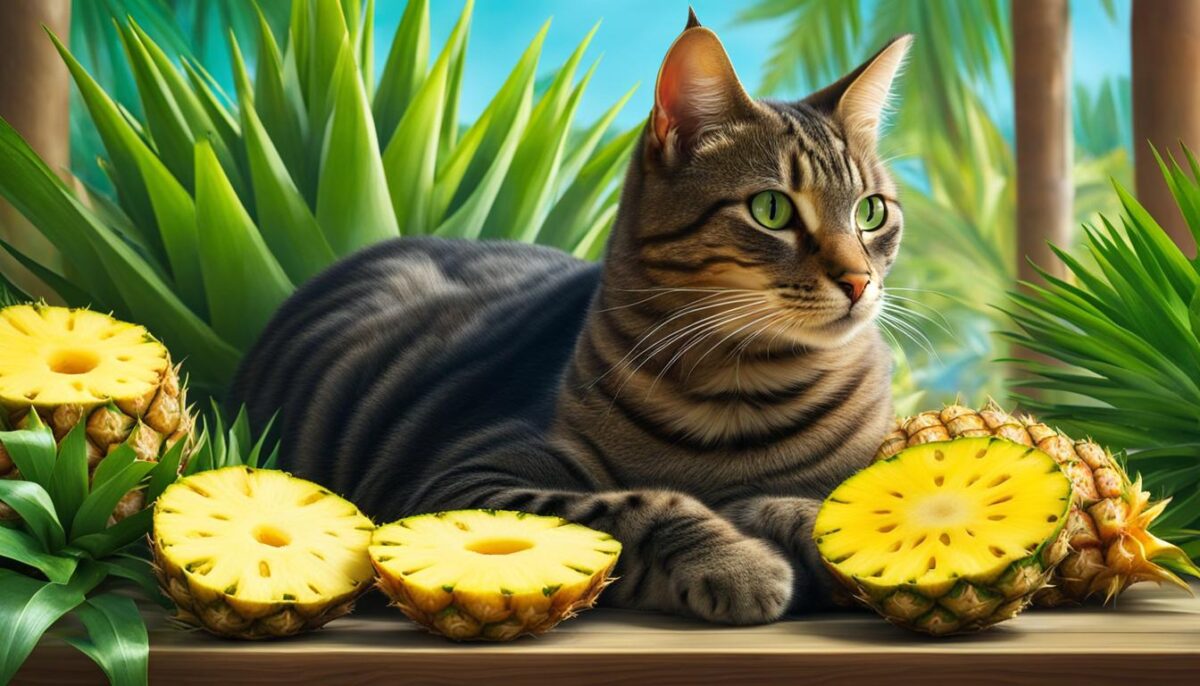Cats and pineapple – it’s a combination that may raise questions for cat owners. Can cats eat pineapple? Is pineapple safe for cats to consume? In this comprehensive guide, we will unravel the truth about felines and this tropical fruit to ensure the health and well-being of our furry friends. Let’s dive in and explore whether cats can enjoy the taste of pineapple and the potential benefits or precautions associated with feeding them this fruit.
Key Takeaways:
- Cats can eat pineapple, but it should be given in moderation and with caution.
- Some cats may be allergic to pineapple, so it’s important to monitor their reactions closely.
- Pineapple can offer health benefits for cats, including vitamins and minerals that support their immune system and overall well-being.
- Always remove the skin and core of the pineapple before offering it to your cat.
- If your cat is sensitive or allergic to pineapple, consider alternative fruits like bananas, blueberries, or watermelon.
The Safety of Feeding Cats Pineapple
Many cat owners wonder whether it is safe to feed their feline companions pineapple. While pineapple is generally safe for cats to eat, there are a few factors to consider.
- Pineapple and Cats Digestion: Pineapple contains an enzyme called bromelain, which can help with digestion in cats. However, it’s important to introduce pineapple gradually into your cat’s diet and monitor their reaction closely. Some cats may have sensitive stomachs or digestive issues, so it’s always best to start with a small amount and observe how they tolerate it.
- Pineapple and Cats Allergies: It’s also crucial to be aware of potential allergies. While rare, some cats may be allergic to pineapple. Look out for any signs of an allergic reaction, such as excessive scratching, vomiting, or diarrhea. If you notice any adverse symptoms, discontinue feeding pineapple and consult your veterinarian.
Additionally, it’s important to feed pineapple to cats in moderation. Too much pineapple can upset a cat’s stomach and lead to digestive issues. It should be given as an occasional treat rather than a regular part of their diet. Always remember to remove the skin and core of the pineapple before offering it to your cat, as these parts can be difficult for cats to digest and may pose a choking hazard.
The Benefits of Pineapple for Cats Digestion
If your cat tolerates pineapple well, it can actually provide some digestive benefits. The bromelain enzyme in pineapple can aid in breaking down proteins and promoting healthy digestion in cats. However, it’s crucial to emphasize that pineapple should only be given in small amounts and as an occasional treat. Consulting your veterinarian before introducing pineapple or any new food into your cat’s diet is always recommended.
By taking these precautions and closely monitoring your cat’s reaction, you can determine if pineapple is a safe and enjoyable addition to their diet. Remember, every cat is unique, and what works for one may not work for another. If your cat does not tolerate pineapple well or has any existing health conditions, there are alternative fruits that can provide similar health benefits. Always prioritize your cat’s well-being and consult with your veterinarian for personalized advice and guidance.
Health Benefits of Pineapple for Cats
Despite the potential risks, feeding cats pineapple in moderation can provide them with several health benefits. Pineapple is a good source of vitamins and minerals that are essential for their overall well-being. It contains vitamin C, which supports a cat’s immune system and helps prevent illnesses. Additionally, pineapple is rich in manganese, which aids in bone health and promotes the proper functioning of enzymes in their bodies. Potassium, another nutrient found in pineapple, can help regulate blood pressure and support heart health in cats.
Furthermore, the bromelain enzyme present in pineapple can assist in digestion. It helps break down proteins and improves nutrient absorption in cats. This can be particularly beneficial for cats with digestive issues or those that need extra support in processing their food.
It is important to note that while pineapple offers these health benefits, it should be introduced to a cat’s diet gradually and in small amounts. Consulting with a veterinarian is crucial to ensure that pineapple is suitable for your cat’s specific dietary requirements and any underlying health conditions they may have. Remember, every cat is different, and what works for one may not work for another.
Comparative Table: Pineapple vs. Other Fruits
| Pineapple (100g) | Bananas (100g) | Blueberries (100g) | Watermelon (100g) | |
|---|---|---|---|---|
| Vitamin C (mg) | 47.8 | 8.7 | 9.7 | 8.1 |
| Manganese (mg) | 0.9 | 0.3 | 0.2 | 0.6 |
| Potassium (mg) | 109 | 358 | 77 | 112 |
Table: A comparison of the vitamin C, manganese, and potassium content in pineapple, bananas, blueberries, and watermelon. Data is per 100 grams of each fruit.
As shown in the table above, pineapple is a rich source of vitamin C, providing nearly five times the amount found in bananas. It also contains higher levels of manganese compared to blueberries and watermelon. However, when it comes to potassium content, bananas have the highest concentration among these fruits. This comparison highlights how pineapple can be a valuable addition to a cat’s diet, along with other nutritious fruits.
Precautions when Feeding Cats Pineapple
When it comes to feeding cats pineapple, there are a few important precautions to keep in mind. By following these guidelines, you can ensure the safety and well-being of your feline friend:
- Remove the skin and core: Before offering pineapple to your cat, make sure to remove the skin and core. These parts can be difficult for cats to digest and may pose a choking hazard.
- Serve in small, bite-sized pieces: To prevent choking and ensure easy consumption, it’s best to serve pineapple to your cat in small, bite-sized pieces. This will also make it easier for your cat to chew and enjoy.
- Monitor for allergic reactions or digestive issues: After your cat consumes pineapple, closely observe their reaction. Look out for any signs of allergic reactions such as itching, swelling, or difficulty breathing. Additionally, keep an eye on their digestion to ensure pineapple doesn’t cause any stomach upset.
By taking these precautions, you can safely introduce pineapple as an occasional treat for your cat. However, it’s always a good idea to consult with a veterinarian before making any significant changes to your cat’s diet, including the introduction of new foods. They can provide personalized guidance based on your cat’s specific health needs.
Alternatives to Feeding Cats Pineapple
If you’re looking for alternatives to feeding your cat pineapple, there are a few safe and delicious options to consider. These fruits not only provide a variety of flavors but also offer similar health benefits to pineapple. Here are some alternatives that can be a nutritious addition to your cat’s diet:
Bananas
Bananas are a great choice as they are rich in potassium, vitamin C, and dietary fiber. These nutrients can help support your cat’s overall health and digestion. Just make sure to remove the peel, cut the banana into small pieces, and offer it as an occasional treat.
Blueberries
Blueberries are packed with antioxidants, which can have numerous health benefits for cats. They are also a good source of vitamins C and K. Serve blueberries as a tasty snack or mix them into your cat’s food for an added burst of flavor and nutrition.
Watermelon
Watermelon is a hydrating fruit that contains essential vitamins A and C. It is low in calories and can be a refreshing treat for your cat during hot summer days. Make sure to remove the seeds and serve small, bite-sized pieces to avoid any choking hazards.
Remember, before introducing any new food into your cat’s diet, it’s always best to consult with your veterinarian. They can provide personalized advice based on your cat’s specific dietary needs and any existing health conditions. By offering a variety of fruits in moderation, you can provide your cat with a well-rounded diet and ensure they receive the nutrients they need to thrive.
| Fruit | Nutritional Benefits |
|---|---|
| Bananas | Rich in potassium, vitamin C, and dietary fiber |
| Blueberries | Packed with antioxidants, vitamins C and K |
| Watermelon | Hydrating, contains vitamins A and C |
Conclusion
In conclusion, cats can indeed eat pineapple, but it’s crucial to exercise caution and moderation when feeding this tropical fruit to your feline friend. While pineapple can offer certain health benefits, it’s essential to monitor your cat’s reactions and consult with a veterinarian beforehand.
When introducing pineapple into your cat’s diet, remember to remove the skin and core and serve the fruit in small, bite-sized pieces. By taking these precautions, you can minimize the risk of choking and ensure easy consumption.
If you notice any signs of allergic reactions or digestive issues after your cat consumes pineapple, it’s important to discontinue feeding the fruit and seek guidance from a veterinarian. They can assess your cat’s specific health needs and provide recommendations for suitable alternatives.
Overall, while pineapple can be a tasty and nutritious addition to your cat’s diet, it’s crucial to prioritize their safety and well-being. By following these guidelines and considering alternative fruits if necessary, you can provide your feline companion with a varied and balanced diet. Remember, the key is to enjoy pineapple with your cat responsibly!
FAQ
Can cats eat pineapple?
Yes, cats can eat pineapple, but it should be given in moderation and with caution.
Is pineapple safe for cats?
Pineapple is generally safe for cats to eat, but some cats may be allergic to it.
What are the health benefits of pineapple for cats?
Pineapple can provide vitamins and minerals that support a cat’s immune system and promote healthy skin and coat.
What precautions should I take when feeding cats pineapple?
Always remove the skin and core of the pineapple, serve in small pieces, and monitor your cat closely for any adverse reactions.
Are there alternatives to feeding cats pineapple?
Yes, other fruits like bananas, blueberries, and watermelon can be safe and nutritious alternatives.
Should I consult a veterinarian before feeding my cat pineapple?
Yes, it is essential to consult with a veterinarian before introducing any new food into your cat’s diet, including pineapple.


